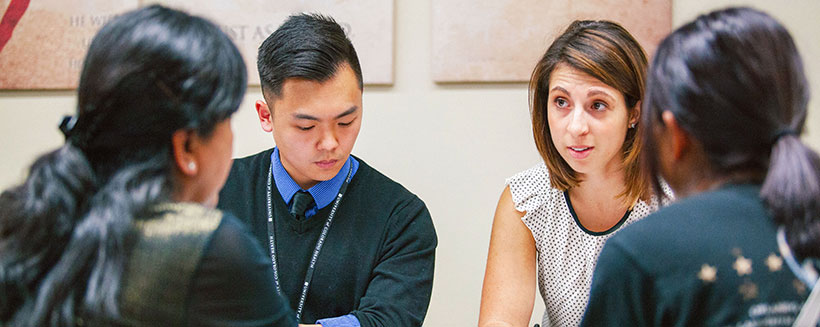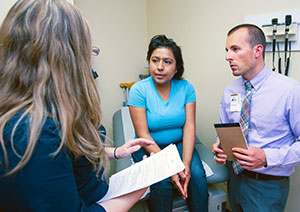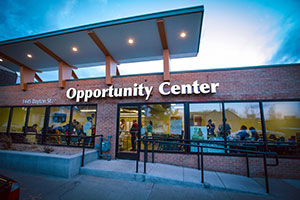DAWN Clinic
Integrated Health Care Experience for Students

By Tonia Twichell
(December 2015) Students from several University of Colorado schools and colleges crowd the back of the student-run DAWN Clinic on an early fall day, just as patients begin arriving.
Before scattering to their stations, the dozens of future doctors, nurses, pharmacists, dentists, physical therapists, physician assistants, and mental health practitioners wrap up the meeting by chanting in unison a precept of Nobel Peace Prize Laureate Bernard Lown, MD: “As much as possible for the patient, as little as possible to the patient,” to remind themselves of the power of providing thoughtful, individualized care.
In the triage area, two students meet 81-year-old Maria Rodriguez, who needs a physical examination to apply for U.S. citizenship. She answers questions from the nursing student who takes her pulse and blood pressure and from the pharmacy student who asks about prescriptions and supplements.
“She lost her Medicaid,” explains her daughter Raquel Rojas, who acts as her Spanish interpreter. “We came to DAWN Clinic because it’s in Aurora and that’s where she lives.”
Designed to provide health care in one of Colorado’s poorest neighborhoods, the DAWN Clinic (Dedicated to Aurora’s Wellness and Needs) also gives CU health science students a rare opportunity to learn how to work as a team to help uninsured patients like Rodriguez.
Unlike more conventional medical settings where professionals often work in isolation from one another, the DAWN clinic is mirroring a national trend to try to bring specialties together – often under one roof. From triage through exam rooms, patients meet with teams of students.
“Someone with chronic disease management might see pharmacy and nursing students,” says Clinic Medical Director Joseph Johnson, MD. “If a diabetic patient comes in with acute complications, medical and pharmacy students might go in. Someone with a medical issue and anxiety or depression or psychological issue will see a CU Denver (behavioral health) student with a medical student.”
Students and faculty say making this revolutionary approach work has required patience, determination and an open mind.
 “At first everyone was focused on their own goals,” says Sarah Tietz, a fourth-year medical student
“At first everyone was focused on their own goals,” says Sarah Tietz, a fourth-year medical student
Once students assess a patient’s condition, they present their findings to a group of preceptors. At least one of the professionals then accompanies students back to the exam room.
“Frankly, this is the way medicine should be taught,” says Alan Feiger, MD, an associate clinical professor
The DAWN clinic opened March 1, 2015, in the Dayton Street Opportunity Center, which offers education, job training and counseling in a storefront just south of Colfax Avenue. The Fields Foundation helped gather financial support while Primary Care Progress (PCP) provided expertise.
“We were the first group to start a clinic with PCP, so we wrote the book,” says Johnson, who was a resident in internal medicine at the CU School of Medicine when he and several health sciences students began planning the clinic two years ago. “Now others are doing it based on our experience.”
An integrated approach works at CU because all Anschutz health sciences students are exposed to integrated health as part of their curriculum.
“The focus on integrated care is one of the main reasons I came to CU,” Tietz says. “In classes, we got to know each other and become friends, but I still didn’t fully understand what the others do and how to work together. We learned that here.”
The clinic, located just two miles from the Anschutz Medical Campus, is open every Tuesday night for general health needs and each Wednesday for physical therapy treatments and mental health service.
 Designed to help underserved adult populations, it offers a range of services including dental and ophthalmology care, lab work and EKGs. A close working relationship with
Designed to help underserved adult populations, it offers a range of services including dental and ophthalmology care, lab work and EKGs. A close working relationship with
Initially, urgent care cases were the norm, but now many patients with chronic illnesses have become repeat visitors.
“We had one three-week period, where we had three strokes. All the patients were under 30 years old,” says Johnson. “We’ve had patients with extremely fascinating eye cases. One Sudanese man went from normal eyesight to being completely blind in three months. We were able to rally ophthalmology to help him get continuity of care through Denver Health.”
CU physicians from specialties as diverse as neurology, radiology, cardiology
“It’s mostly
She said the network reaches outside CU as well. For example, recently a diabetic patient needed
She’s been so impressed with the interprofessional approach at the clinic that she would like to find a similar situation in her residency.
“It’s really helped with my perspective,” Tietz says. “I’ve learned how much I want a program like this. It makes such a difference. It makes for better outcomes.”